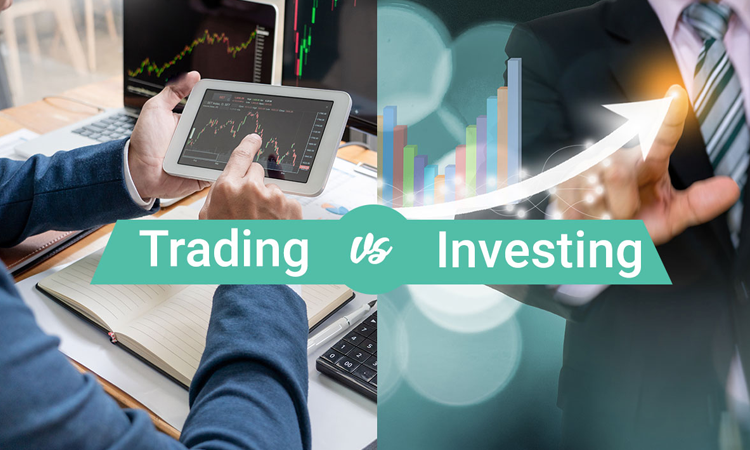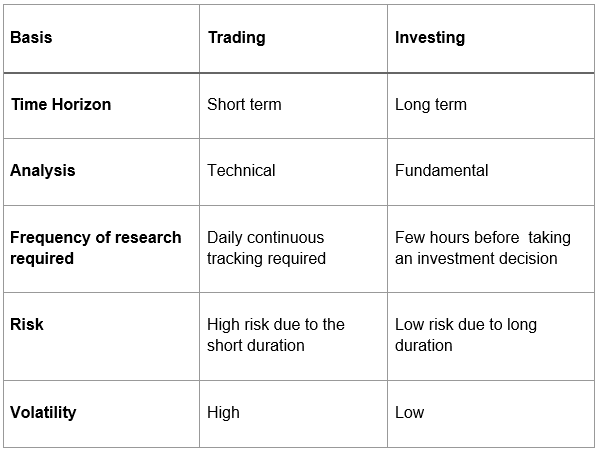
There is always a conflict between traders and investors, where on one side traders have strong opinions on a stock, make trades on them, book profits, and exit timely. On the other hand, investors are the epitome of patience and determination. Thus, this situation of trading vs investing remains unsolved.
And if you think deeply no one is more or less neither a trader nor an investor. It all depends on your knowledge, risk profile, and of course your need or requirement. So let's first discuss trading in detail.
In this discussion of trading vs investing, nowadays everyone today feels like a trader. Either they make money or lose for most of the time, people find it very fascinating to be associated with the term ‘trading’. But the reality is trading is not everybody’s cup of tea and requires a lot of skill, knowledge, and practice, like any other profession demands. People who want to make money in the stock market do a lot of research and analysis: fundamental & technical analysis understands market trends and most importantly “Confidence & conviction” is the main ingredient for a successful trade.
What is trading?
In general terms, trading is frequent buying and selling of securities like stocks, bonds, and other financial instruments as well. Today, trading has become so easy and paperless and everything can be done online. These online trading portals have made buying and selling of all instruments like stocks, mutual funds, ETFs, or even bonds efficient and convenient for investors.
Types of Trading
There are various types of trading which are as follows:
- Scalping: A very short term trade in which trade is made for less than an hour or so. Thus, analyze trading signals through minutes charts
- Day trading: It is just the other name of intraday trading where trade is made during the day and excited for that trade before market closing on the same day. The trade is made for a few hours.
- Swing trading: In this type of trading the trade is held for a few days or weeks and observed through 1hour, an hour, or daily charts
- Position trading: In the case of trading, the long-term position for a trade is a few months or at max for a year and not beyond that.
There has been a hype in traders in the last few years and many people are trying their hand in trading by making some speculations which might book profit for once or twice but when it comes to losing out money many of them lose out even the principal amount. That’s why we say “Little is a dangerous thing.” People have an observation and analytical power to read charts, draw out patterns, and understand markets can make hell out of money directly from trading. But the percentage of this less, that’s why the scenario of trading vs investing in stock prevails.
So in trading vs investing, we have understood a lot about trading now, let’s understand what investing is all about.
What is investing?
Well, Investing is plunging your money in some financial instruments to reap our returns in the future after a long period. Generally, investment is made for a certainly longer duration than a trade. The sole purpose of investment is not booking profits, it could be for a particular goal or for saving purposes but not mainly as a main source of income and mostly as an extra income. Investing in stocks directly can be done and most feasible for conservative investors or people who understand the background and working of the company they have invested their money in or planning to invest in. Therefore, it also requires knowledge and understanding of fundamental analysis where you can even calculate if any stock is undervalued or overvalued. Though it's a little easier than trading because it requires one-time research and analysis on stocks as you are investing for a longer duration but still easier said than done.
What are the Different Investment Strategies?
Various investment strategies are being generally followed by investors, which are as follows:
- Passive & Active investing
- Growth investing
- Value investing
- Income investing
- Dividend growth investing
- Contrarian investing
- Index investing
The above investment strategies are generally used by the masses for investing by their thinking approach and their risk appetite. Thus, in the case of investing when we are investing money for a longer period, investment should be made in capital markets through Mutual Funds. Mutual funds are a better form of investing rather than directly investing in stocks. Because in mutual funds there is some accountability by the fund manager of a particular AMC who is an expert in his job. Also, investing through a mutual fund makes more sense as there is a risk diversification through the planned portfolio. Investing can be a much more comprehensive exercise in which rather than making investments just for sake of wealth creation without goal or direction but instead, investments should be made following your financial goals so that in the future course of time your dreams, your personal goals can be achieved successfully.
Thus, to conclude this argument of trading vs investing, if we draw out comparisons, the following would be the conclusion.
Trading vs Investing

People often ask
- Is forex trading riskier than stocks?
- What type of trading is most profitable?
- Are trading bots legal?
- What are the 4 types of stocks?
- Can you buy and sell the same stock repeatedly?
Forex trading has fewer rules than stocks and more leverage, therefore it generates high returns and is riskier than stocks.
People have different opinions about which trading is profitable. For some it’s the hedge funds and for others, it’s “buy and hold”. It depends on your preference and your risk appetite.
Trading bots are legal as long as it doesn’t violate the rules of trading, however, many companies and brokers don’t allow trading bots to be a part of their system owing to several reasons like technical glitches, etc.
Though there are different kinds of stocks in the market based on different parameters, the 4 most common types of stocks are large-cap stocks, mid-cap stocks, small-cap stocks, and hybrid stocks.
You can buy and sell the same stock repeatedly but you must be vigilant of how many times you buy or sell the same stock in 30 days’ time.
Conclusion
Thus, summing up trading vs investing from the above table, both have their merit and demerits. As I said earlier, it all depends on certain factors like your knowledge, skill, risk profile, and most importantly your goals. Where, in trading, it depicts a trait of hare (impatient) but with that you require the skill of reading charts, making accurate predictions on the other hand investing is a game of a tortoise (patience), along with the ability to judge the good stocks or mutual fund to invest into.